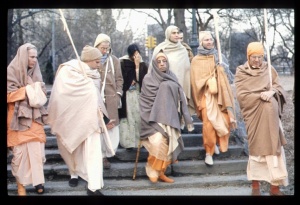CC Antya 5.104-105: Difference between revisions
m (1 revision(s)) |
No edit summary |
||
| Line 1: | Line 1: | ||
{{ | [[Category:Sri Caitanya-caritamrta - Antya-lila Chapter 05|CC105]] | ||
<div style="float:left">'''[[Sri Caitanya-caritamrta|Śrī Caitanya-caritāmṛta]] - [[CC Antya|Antya-līlā]] - [[CC Antya 5|Chapter 5: How Pradyumna Miśra Received Instructions from Rāmānanda Rāya]]'''</div> | |||
<div style="float:right">[[File:Go-previous.png|link=CC Antya 5.103|Antya-līlā 5.103]] '''[[CC Antya 5.103|Antya-līlā 5.103]] - [[CC Antya 5.106|Antya-līlā 5.106]]''' [[File:Go-next.png|link=CC Antya 5.106|Antya-līlā 5.106]]</div> | |||
{{CompareVersions|CC|Antya 5.104-105|CC 1975|CC 1996}} | |||
{{RandomImage}} | |||
==== TEXTS 104-105 ==== | ==== TEXTS 104-105 ==== | ||
<div | <div class="verse"> | ||
:'vyākaraṇa' nāhi jāne, nā jāne 'alaṅkāra' | |||
:'nāṭakālaṅkāra'-jñāna nāhika yāhāra | |||
kṛṣṇa-līlā varṇite nā jāne sei chāra! | :kṛṣṇa-līlā varṇite nā jāne sei chāra! | ||
viśeṣe durgama ei caitanya-vihāra | :viśeṣe durgama ei caitanya-vihāra | ||
</div> | </div> | ||
| Line 14: | Line 18: | ||
==== SYNONYMS ==== | ==== SYNONYMS ==== | ||
<div | <div class="synonyms"> | ||
''vyākaraṇa''—grammar; ''nāhi jāne''—does not know; ''nā jāne''—does not know; ''alaṅkāra''—metaphorical ornaments; ''nāṭaka-alaṅkāra''—of the metaphorical ornaments of drama; ''jñāna''—knowledge; ''nāhika''—there is not; ''yāhāra''—of whom; ''kṛṣṇa-līlā''—the pastimes of Lord Kṛṣṇa; ''varṇite''—to describe; ''nā jāne''—does not know; ''sei''—he; ''chāra''—condemned; ''viśeṣe''—especially; ''durgama''—very, very difficult; ''ei''—these; ''caitanya-vihāra''—the pastimes of Lord Śrī Caitanya Mahāprabhu. | |||
</div> | </div> | ||
| Line 21: | Line 25: | ||
==== TRANSLATION ==== | ==== TRANSLATION ==== | ||
<div | <div class="translation"> | ||
"A poet who does not know the grammatical regulative principles, who is unfamiliar with metaphorical ornaments, especially those employed in drama, and who does not know how to present the pastimes of Lord Kṛṣṇa is condemned. Moreover, the pastimes of Śrī Caitanya Mahāprabhu are especially difficult to understand. | |||
</div> | </div> | ||
__NOTOC__ | |||
<div style="float:right; clear:both;">[[File:Go-previous.png|link=CC Antya 5.103|Antya-līlā 5.103]] '''[[CC Antya 5.103|Antya-līlā 5.103]] - [[CC Antya 5.106|Antya-līlā 5.106]]''' [[File:Go-next.png|link=CC Antya 5.106|Antya-līlā 5.106]]</div> | |||
__NOTOC__ | |||
__NOEDITSECTION__ | |||
Revision as of 10:17, 1 October 2021

A.C. Bhaktivedanta Swami Prabhupada
TEXTS 104-105
- 'vyākaraṇa' nāhi jāne, nā jāne 'alaṅkāra'
- 'nāṭakālaṅkāra'-jñāna nāhika yāhāra
- kṛṣṇa-līlā varṇite nā jāne sei chāra!
- viśeṣe durgama ei caitanya-vihāra
SYNONYMS
vyākaraṇa—grammar; nāhi jāne—does not know; nā jāne—does not know; alaṅkāra—metaphorical ornaments; nāṭaka-alaṅkāra—of the metaphorical ornaments of drama; jñāna—knowledge; nāhika—there is not; yāhāra—of whom; kṛṣṇa-līlā—the pastimes of Lord Kṛṣṇa; varṇite—to describe; nā jāne—does not know; sei—he; chāra—condemned; viśeṣe—especially; durgama—very, very difficult; ei—these; caitanya-vihāra—the pastimes of Lord Śrī Caitanya Mahāprabhu.
TRANSLATION
"A poet who does not know the grammatical regulative principles, who is unfamiliar with metaphorical ornaments, especially those employed in drama, and who does not know how to present the pastimes of Lord Kṛṣṇa is condemned. Moreover, the pastimes of Śrī Caitanya Mahāprabhu are especially difficult to understand.